Considering The Audience
Writing for Diverse Audiences
I sat down with Kira Obolensky, who is in her second year as an Andrew W. Mellon resident playwright at Ten Thousand Things in Minneapolis. Kira is one of fourteen playwrights to receive this three-year residency. Ten Thousand Things, under the artistic vision of Michelle Hensley, brings free theatre to homeless shelters, prisons, and other community venues and presents paid performances to general theatregoers. Through the course of her term, Kira is learning more about the diverse audience that Ten Thousand Things serves and is writing three new plays specifically for the theatre. Last year, I wrote an article outlining the nature of the residency and the premiere of Kira’s play Dirt Sticks.
In this interview, I was able to garner deeper insight into the artistic and personal effects of the residency and learn more about Kira’s latest play, Forget Me Not When Far Away, which premiered with Ten Thousand Things this spring after a development workshop at the Playwrights’ Center.
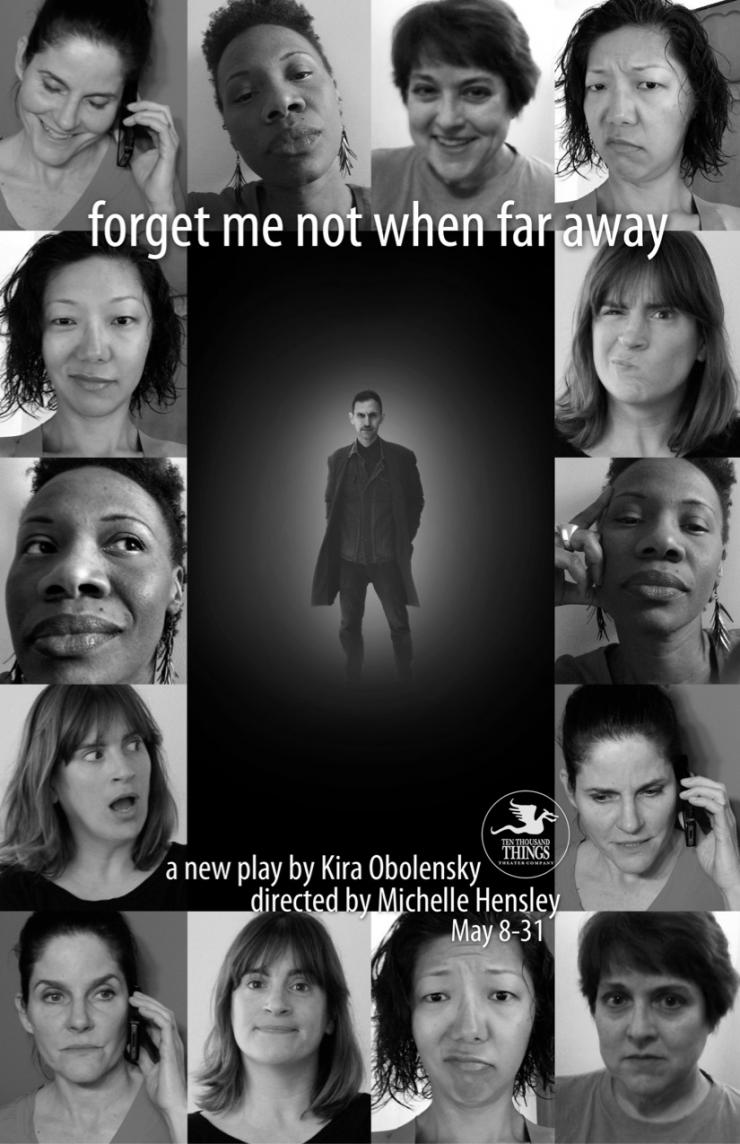
Photo courtesy of Kira Obolensky.
Hayley Finn: What has been the most significant change for you in your life and your career having received this residency?
Kira Obolensky: It has had a profound impact on me. For one, it’s made meunderstand in different ways the power of narrative to create connection. I think those of us who work in the theatre can forget how extraordinary it is to be able to craft a story that people can collectively experience. Writing for Ten Thousand Things is writing for a very diverse range of human beings who will witness the play. Having that incredible audience in mind has, I think, made my plays better. It has made me feel useful.
I feel like the playwright is in the business of imagining bigger worlds, and by putting the audience there—especially with the class spectrum—I feel like the plays get deeper and bigger.
Hayley: On a practical level, how has it changed your everyday existence?
Kira: It’s given me a sense of purpose; I’ve written more than I’ve been able to write in five years in the past year and a half. And the sense of directionality for the work—the idea that so many different people in so many different contexts will see the work has made my writing feel very purposeful. My focus has been on writing; on learning from the staff of the theatre and its audiences. My day to day is much more grounded in a sense of mission. And I haven’t been hustling for work. When it’s over I’ll have written new three plays, a trilogy that connects in interesting ways.
Hayley: Ten Thousand Things has committed to producing three plays you write during your three-year residency period.
Kira: The fact that what I’m writing is going to be produced has been an amazing experience, one that’s certainly made me a better writer. And, along with that, the residency has allowed me to feel part of an organization that is doing fantastic work.
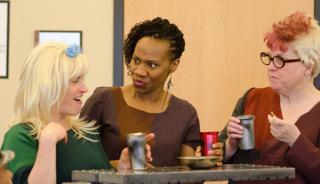
in Forget Me Not When Far Away.
Photo by Paula Keller.
Hayley: In the past you’ve mentioned that Ten Thousand Things has changed the way you think about theatre. Could you expand upon that?
Kira: I think that we all go into theatre believing that it can make a profound impact; that a story that’s collectively experienced can galvanize, and it can connect us in terms of our imaginations in a way that nothing else can. I believe that theatre is the gym to work the muscle of the imagination. Nothing else in our society or culture really does that in a collective way. Ten Thousand Things has an intentional bare bones aesthetic, which allows all of its audience members to gather and imagine new worlds together. That process has made me reconnect to all of those passionate ideas I used to have about theater when I was much younger, like the idea that theater can bring us together with the use of our imaginations.
Hayley: A lot of the theatres that are writing plays or producing plays for specific communities say: “Let’s do a universal play. Let’s do a Shakespeare, because everyone can identify with Shakespeare in some way.” Or: “Let’s create a specific piece for that community, so we’re going to interview people, and it’s going to be a play that centers on an issue to promote dialogue.” I’m curious to know where you think the idea of universality fits into the equation, and how specific or how universal can a play be?
Kira: Great question. I think that there’s room in this world for everything. There’s a lot of validity to working within a community—identifying and listening to their stories and creating something that’s rich in the process of making and that expresses the issues within a community. That isn’t what Ten Thousand Things does. Ten Thousand Things looks for plays that have enough access points, enough complexity and ambiguity for many different audiences to engage with them. As a playwright, I have experienced this idea of universality even as I understand and appreciate that cultural differences are real and beautifully specific. I think that there is terrific work that expresses differences and specificities; and I also believe there are universal questions that we all grapple with. These questions are not middleclass questions about divorce or about the loss of property. They’re much bigger questions, like: What does it mean to be in exile from your homeland? What does it mean to come home to a place that has changed? What is fate? How do we remain loyal to a past and present to a new future? And I think that it’s in the writing of the play and it’s in the style, actually, that allows something to be universal.
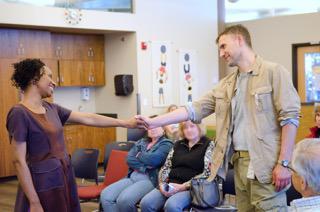
Forget Me Not When Far Away.
Photo by Paula Keller.
Hayley: I think of your style as inherently theatrical. One of the aspects of your work that I’m attracted to is that you create unique worlds that are familiar but askew.
Kira: I think when you build the world for a play, you hope there can be lots of points of entrance for all different sorts of people. I think you have to make it—Michelle talks a lot about this—a place where no one can be an expert. So in this creation of something that we hope can appeal to a wide variety of people, you have to blur the background, so it’s never a kind of place or time where people know it very well.
Hayley: Can you talk a bit about the most recent play you’ve written for Ten Thousand Things, Forget Me Not When Far Away, and how it fits into that aesthetic?
Kira: Forget Me Not When Far Away is loosely inspired by the Horvath play Don Juan Comes Back from the War. I admire the theatricality of the play, but not the heart of the play, which feels misogynistic and mired in negativity. It’s interesting how one play leads to another play. I feel like with Dirt Sticks I was really writing about this idea of the past, and wondering if things that were done in the past could be undone in the present. Forget Me Not When Far Away is a kind of extension of that thematically, although it’s more about what happens when you’re trying to recreate a past and the world has moved on.
Hayley: When you are writing for Ten Thousand Things, you are thinking a lot about your audience. I know that you have attended several performances in prisons, shelters, and other places where your plays will be performed. How does that affect your writing?
Kira: The way I think about the audience is not unlike how a playwright summons a character. We don’t know who the character is, right? We write them, but we don’t even know what they’re going to be like until an actor embodies them. For me, the thinking of the audience is really allowing them a place. They’re in my imagination, and then they’re part of that conversation I hope the play is having, and then they come in and embody the role I’ve made for them. So I view it as a creative act, not an editorial act. I think it’s inviting them to the table. For me, thinking about this big audience makes my play bigger, because the things I’m worried about right now—getting my son into a good high school, you know, etcetera, etcetera—I’m not sure I want to be writing plays about that. I feel like the playwright is in the business of imagining bigger worlds, and by putting the audience there—especially with the class spectrum—I feel like the plays get deeper and bigger.
Hayley: I love this notion of “casting” the audience into the piece. Imagining them. And that’s been a shift for you in this residency, even though you’ve written for Ten Thousand Things before.
Kira: I think I’m getting better at it. And I think it is making my plays better. I think, actually, if every playwright—even if they didn’t have access to these amazing audiences—were to think about their plays with a bigger range of humanity in mind for receiving their play, we would have a canon of beautiful, complicated expressions of the world we live in.
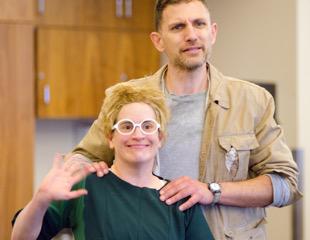
Forget Me Not When Far Away.
Photo by Paula Keller.
Hayley: Can you talk a little bit about seeing Dirt Sticks last year and some surprises that you had seeing it in front of an audience?
Kira: It sort of became about something different in every venue. We were in a women’s prison, and at one moment in the play Henry Wand finds a baby in a cardboard box. In the production of the play, the baby is kept underneath one of the audience member’s seats. Henry finds the baby and he’s trying to figure out what to do with it He goes through this whole thing and decides that babies are just a whole lot of trouble, and he’s just going to leave the baby where he found it. And the women wouldn’t let him, they were having a moral reaction. “You don’t do that. You don’t abandon a child.” We’re in a women’s prison…and we get the highest moral response to that moment.
We did the play in a teenage pregnancy center. In that production what surprised me so much is a moment when Henry Wand realizes he’s with the ghost of his mother when she’s pretty much his age, and the mother, Rose, marvels at what her son has grown up into. The mother meets the child as a young man. In no other venue did this happen, but through that lens with these teenaged girls there was this exquisite, aching silence where the girls suddenly were catapulted to this place of imaging their own children grown up. We could all feel it.
In a chemical dependency center, the women showed us that the play is about second chances. And I’d never thought the play was about that. It’s a pretty profound thing when you see a story affect somebody—when the audience itself changes the meaning of the play.
And I think that’s what we want to do in the theatre. We want our stories to connect with somebody. I think that in the mainstream theatre—for better or for worse, perhaps because most of us middleclass people see so many stories—we don’t always get that surprising response to the power of narrative.
Hayley: How do you think that this time will inform your work beyond the residency itself?
Kira: I have a sense of mission that’s going to inform my work. This idea of thinking in a much more direct and creative way about who you want the play to be for is something that I think will always be part of the work I do. It just makes the work better; makes it less about that kind of endless navel-gazing that I think I’ve done plenty of. It’s refreshing to not have to think that my own personal sturm und drang has to be the genesis of everything. I’d be writing very boring plays, if that were the case!
When this is over, I’ll have taken entirely total advantage of this opportunity. I’ll end the residency with a new body of work I’m very proud of, a clear sense of direction, and a profound gratitude for the chance to work with this exceptional company.



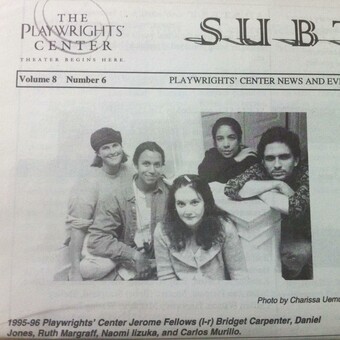







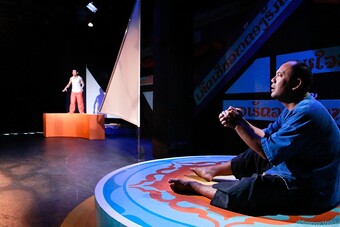





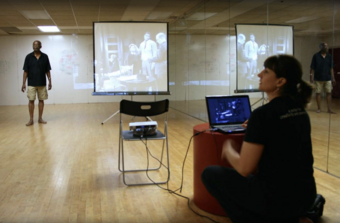


Comments
The article is just the start of the conversation—we want to know what you think about this subject, too! HowlRound is a space for knowledge-sharing, and we welcome spirited, thoughtful, and on-topic dialogue. Find our full comments policy here